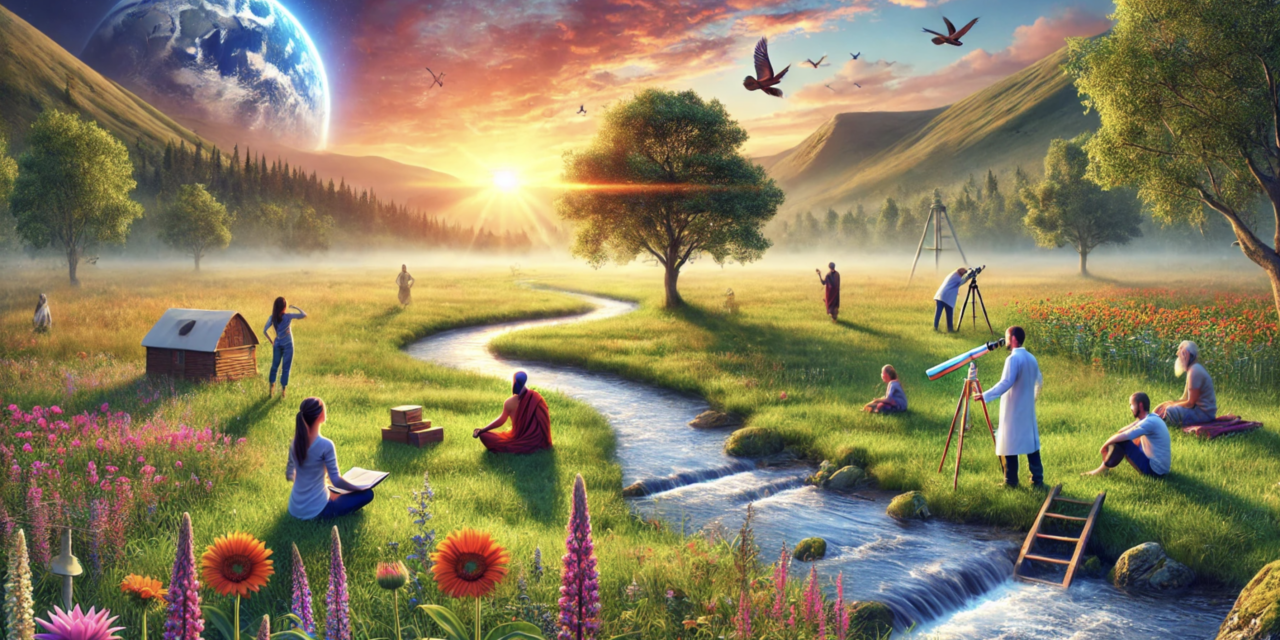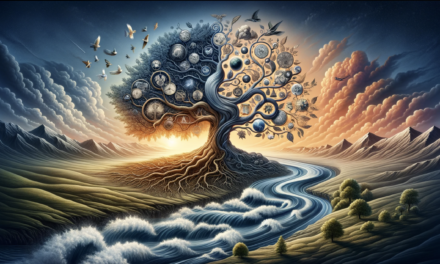“Progressive spirituality has been particularly shaped … by a range of cultural and intellectual movements that have become increasingly influential on western religion since the 1960s. These movements have emerged as a response to four different perceived needs – the need for a credible religion for a modern age; the need for religion which is truly liberating and beneficial for women; the need to reconnect religion with scientific knowledge; and the need for a spirituality that can respond to the impending ecological crisis.” (Gordon Lynch, The New Spirituality)
Introduction
For over four billion years, life and Earth have co-evolved in a symbiotic dance, fostering the conditions necessary for the emergence of complex systems and species. In this delicate balance, humanity has found its place, flourishing under the stable climate of the Holocene epoch. Yet, as we now face a rupture in the systems that sustain our existence, it is increasingly clear that a cultural and systemic shift is needed—not just in how we act, but in how we think, connect, and understand our place within the greater web of life. This essay argues that spirituality should be reimagined as a central force in cultivating an “ecology of hope,” a dynamic and living system of values, relationships, and practices that foster resilience, equity, and flourishing for all life.
Drawing upon Gordon Lynch’s insights, particularly his identification of the need for a spirituality that is credible, liberating, scientifically integrated, and responsive to the ecological crisis, I explore how these needs can shape a new spirituality capable of guiding humanity toward this ecology of hope.
A Credible Spirituality for a Modern Age
Modernity has challenged traditional religious frameworks by demanding that they align with reason, evidence, and pluralistic values. The “credible religion” that Lynch describes is one that resonates with the intellectual and ethical sensibilities of a scientific and interconnected world.
In rethinking spirituality for an ecology of hope, this credibility should become essential. Spirituality should provide not only a personal sense of connection but also a rational and collective foundation for action. It should acknowledge the realities of our ecological crisis and the scientific understanding that underpins it, while also inspiring a sense of wonder and reverence for life’s interdependence. A credible spirituality for our time does not reject science but transcends reductionist materialism, integrating insights from systems thinking, thermodynamics, and evolutionary biology into a moral framework that motivates sustainable behaviour.
By fostering this integration, spirituality can serve as a bridge between the empirical and the transcendent, providing a foundation for hope that is both grounded and aspirational.
Liberation and Inclusion
Historically, spirituality and religion have often been tools of oppression, particularly for women and marginalized groups. A spirituality for an ecology of hope should break from this past and embrace liberation, inclusion, and equality.
Liberation here extends beyond gender and social justice to include ecological justice. Just as spirituality should be liberating for individuals, it should also champion the liberation of ecosystems from exploitation and degradation. This requires a relational and inclusive understanding of spirituality, where the sacred is recognized not only in human relationships but also in our relationships with non-human life and the Earth itself.
In this sense, rethinking spirituality involves embracing a perspective that is inherently world-centric, seeing all beings as interconnected participants in a shared reality. This inclusive spirituality cultivates hope by fostering a sense of belonging and responsibility, transcending individual and anthropocentric concerns.
Reconnecting with Scientific Knowledge
Modernity’s separation of science and spirituality has led to a fragmented understanding of the world, with science often seen as devoid of meaning and spirituality dismissed as unscientific. Yet, as Lynch notes, there is a growing need to reconnect religion—and by extension, spirituality—with scientific knowledge.
For an ecology of hope, this reconnection should be vital. Science reveals the intricate interdependence of Earth’s systems and the delicate balances that sustain life. It also provides the tools to address the crises humanity faces. Spirituality, meanwhile, offers the moral compass and sense of purpose needed to guide scientific knowledge toward regenerative ends.
By uniting these domains, spirituality can inspire a shift from extractive, short-term thinking to a recognition of humanity’s role as stewards of a living planet. This fusion of science and spirituality fosters a holistic understanding of our world, cultivating a sense of awe and responsibility that motivates both individual and collective action.
Responding to the Ecological Crisis
The ecological crisis is fundamentally a spiritual crisis. It is not merely a problem of technology or policy but a rupture in humanity’s relationship with the Earth. As Lynch highlights, spirituality should evolve to address this rupture, providing a framework for reconnecting with the natural world and recognizing its intrinsic value.
In cultivating an ecology of hope, spirituality should emphasize interdependence, humility, and care. It should challenge the dominant narratives of control and consumption, replacing them with narratives of reciprocity and regeneration. This shift requires not only intellectual acknowledgment but also emotional and spiritual engagement—a deep sense of connection to the Earth as a living system of which we are an inseparable part.
Spirituality thus becomes a source of hope, reminding us that even amidst crisis, life has the capacity to adapt, regenerate, and flourish. By aligning human energy with planetary energy flows, spirituality can guide us toward practices and systems that sustain life rather than diminish it.
Spirituality and the Ecology of Hope
The concept of “ecology” itself implies a dynamic, living system—one that evolves through relationships and interactions. An “ecology of hope” is not something that can be built in the mechanistic sense; it should be cultivated, tended, and allowed to grow. Spirituality, reimagined for our time, provides the foundation for this cultivation.
By addressing the four needs Lynch identifies—credibility, liberation, integration with science, and ecological responsiveness—spirituality becomes a living force for transformation. It inspires hope by fostering connection, meaning, and responsibility, guiding humanity toward a flourishing planet.
In this vision, spirituality is not a retreat from reality but a call to engage with it fully, recognizing the sacredness of life and the profound potential of human energy to regenerate the systems that sustain us. In rethinking spirituality, we do not merely address humanity’s crisis of meaning; we lay the groundwork for a future in which all life can thrive.
Terry Cooke-Davies
9th January, 2025
Profound thanks to ChatGPT(4o) from OpenAI for assistance with this article.






